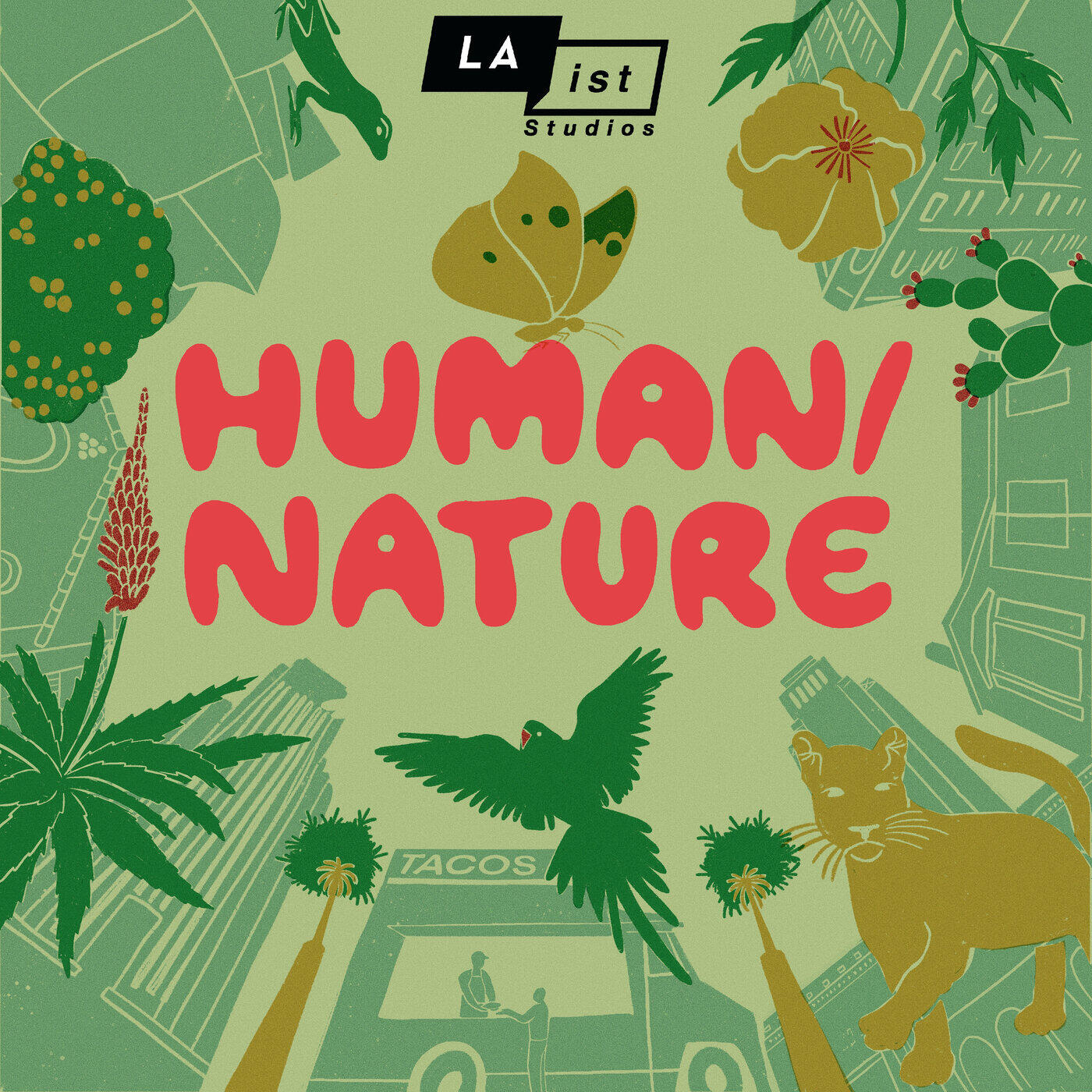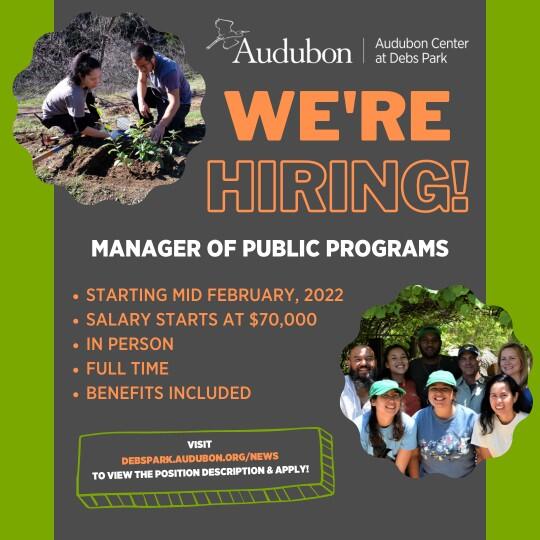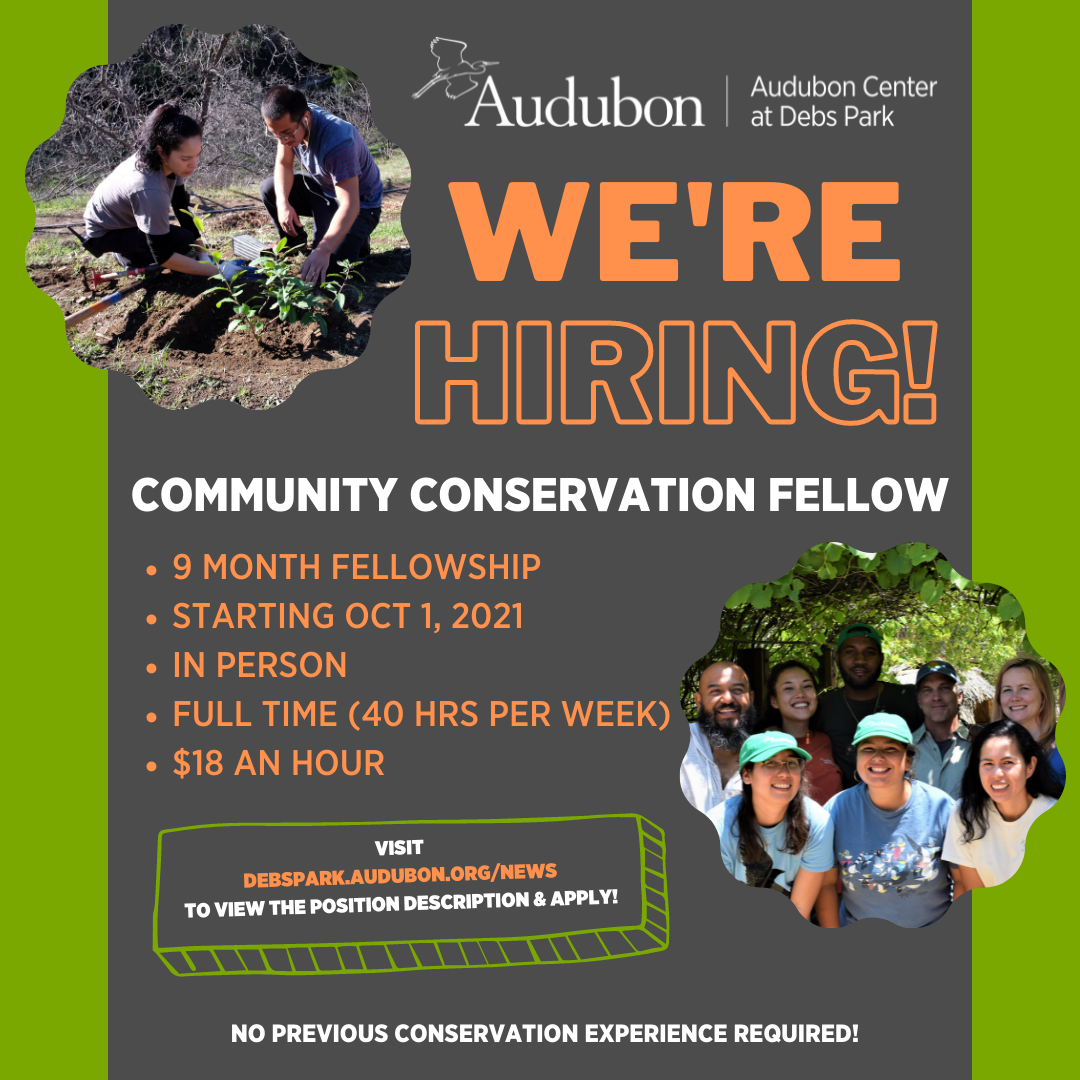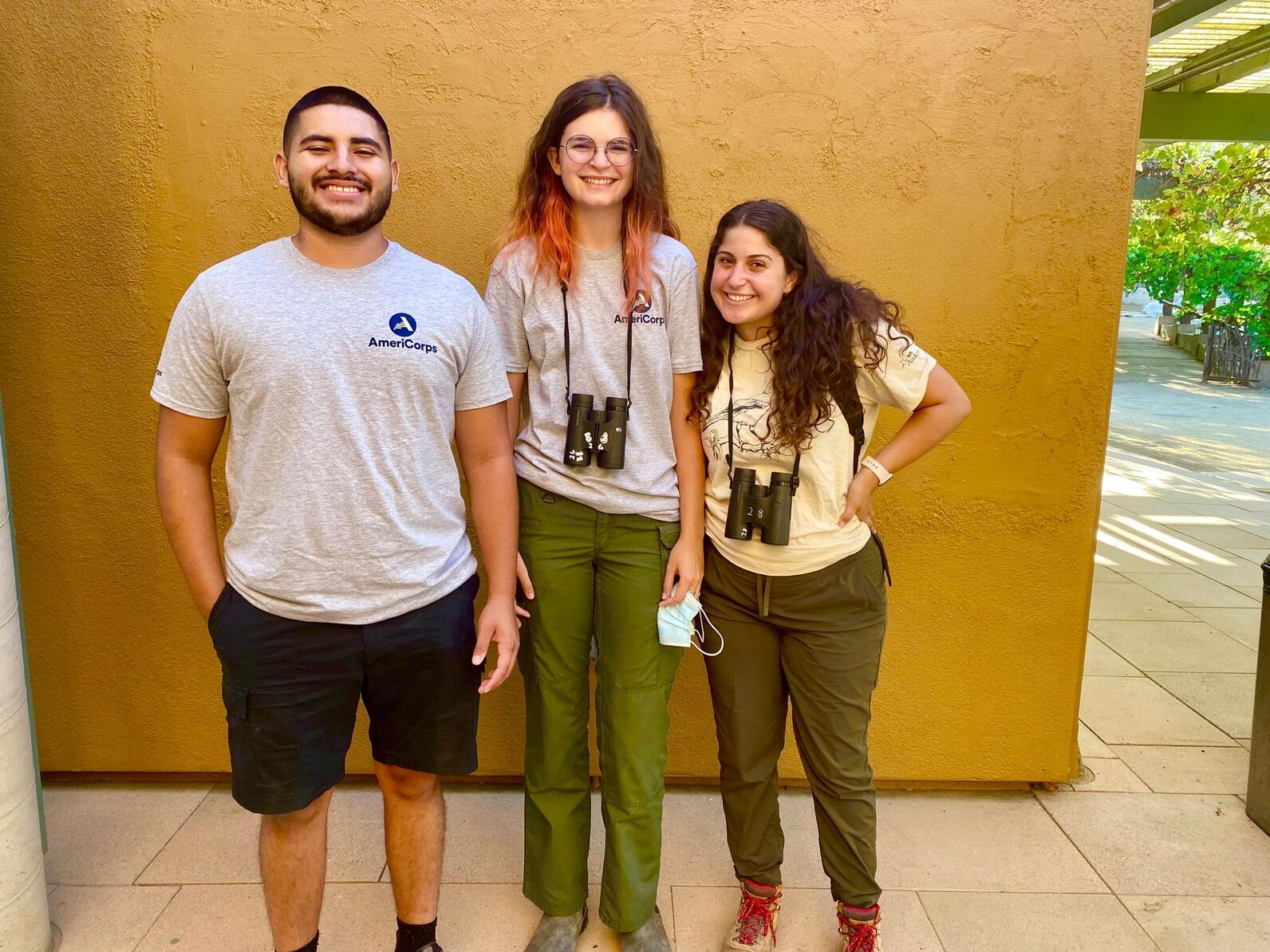
Join Marcos as he embarks on a journey exploring the fascinating, complicated, and inspiring world of urban nature in LAist Studio's newest podcast: Human/Nature:
Human/Nature, a podcast with a wild yet inspiring thesis: if you step outside and reconnect with nature in your own city, you’ll feel better, reconnect with yourself, and find your place in the world. This podcast will empower you to reclaim your attention. Spending time in nature isn’t just good for our minds — in this tech obsessed culture — it’s the ultimate form of resistance.
As a native Angelino, Evelyn is very excited to be part of the Audubon Center at Debs Park crew. Growing up in South Central Los Angeles, she has always enjoyed walks in her neighborhood and finding the hidden gems where nature thrives in the cityscape. As a kid she looked forward to three-day weekends when she would get to go camping. She disliked the food prep, packing up the car, and what felt like an extra-long car ride, but she loved sitting by the river, running around, and using the trees to play hide and seek. When not working you can find Evelyn hiking, tide pooling, or playing board games.
Evelyn earned her Bachelor's Degree from the University of California- Santa Cruz (UCSC) in Marine Biology and her Master's degree from the California State University- Fullerton (CSFU) in Conservation Biology. As an undergrad she was a docent at the Seymour Center, a small aquarium in Santa Cruz, where she was exposed to the world of informal education. While completing her Master's degree Evelyn realized that she loved teaching outdoors and utilizing everything around her to connect people with the natural world around them, and to inspire excitement and curiosity. She spent 11 years as a member of the Education Department at the California Science Center in Exposition Park. She is excited to use her experience to connect people with nature and empower our visitors to see themselves as naturalists.

The Manager, Public Programs will play a lead role in the development and execution of events and programs that drive attendance, expand the guest experience and grow and diversify the audience at the Audubon Center at Debs Park. Specifically, the Manager of Public Programs will be responsible for the development of innovative programs that support and align the Center’s educational and public programs with Audubon California and National strategies and initiatives. Additionally, they will work with the Center Director to build the centers flagship programs around Youth Leadership Development. The candidate must be a strategic thinker who is skilled at building internal and external partnerships and is an effective communicator.
Contact Marcos.Trinidad@audubon.org with any questions!
The newest addition to the Debs Park team, Jansy is the Center's first-ever Community Conservation Fellow. The Community Conservation Fellowship program employs two young adults at the Audubon Center at Debs Park and the Richardson Bay Audubon Center through a 9-month fellowship that prepares them to enter the conservation workforce with skills and experience in habitat restoration, volunteer leadership, and policy advocacy.
Hailing from South Central LA, Jansy is excited to join the Debs Park familia. Jansy is the youngest out of three siblings, and the only person in her family to take interest into pursuing an education in biology. Jansy’s love for nature comes from her parents. Both of her parents are immigrants from El Salvador and shared their love for nature with her since early childhood by visiting many parks and going on camping trips to places like Sequoia National Park. During Jansy’s studies at the University of California, Merced, she gained a new appreciation for nature when learning about how many plant species are displaced due to agriculture and urban development.
Througout her fellowship, Jansy will be focused on habitat restoration at Debs Park, youth leadership development, community engagement, and more!
Jansy’s favorite bird is the Anna’s Hummingbird and she loves to read in her free time (accepting all book recommendations). She is most excited about meeting everyone at Debs, being out in nature, and helping her community.
Huge thanks to the Maggie Walker Incentive Fund for their help in making the Community Conservation Fellowship possible!

We are currently accepting applications for a Community Conservation Fellow. This is a 9-month position that will be starting October 1, 2021. This position is a great fit for anyone interested in habitat restoration, community engagement, and youth leadership development. Previous experience in conservation work is not required.
Contact Marcos.Trinidad@audubon.org with any questions!

Please join us in welcoming the first-ever cohort of California Climate Action Corps Fellows to the Center! The Fellows are currently serving a two month term as Americorps members and they will be working at the Center through August 2021. They have been gaining hands-on experience in habitat restoration and site management, native plant propagation and identification, point count surveying and bird identification, community engagement, project development & more! The Fellows have also each created an interpretation table, which are offered to the public Saturday mornings in August from 9am-11:30am. Come on by to meet the Fellows and learn more about mammals, reptiles, and birds in Debs Park!
Ricardo Rodriguez is a California Climate Action Corps fellow who is studying Biology with an emphasis in Human Biology at the University of California, Merced. Ricardo is in his senior year and hopes to graduate in May of 2022. This fellowship allows him to work outdoors with many different species of wildlife and it allows him to contribute to the fight against climate change by working on habitat restoration, community engagement, and education. He is excited to build his leadership and communication skills. His goal for this summer is to summon and hold a Red Tailed Hawk on his arm by the end of the fellowship. He was born on 7/11 and delivered inside a 7/11. Yes, like the convenience store.
Mia is a California Climate Action Corps fellow who is working on native habitat restoration and researching native plant success rates within our new summer restoration sites. Mia graduated as a Biology Major from Occidental College, and at Oxy, she was also a player on the Women’s NCAA Lacrosse Team, the president and cofounder of a marine conservation and sustainability club on-campus, a member of Kappa Alpha Theta sorority, and a student researcher in the Biology Dept with Dr. Amber Stubler—studying Jamaican coral reef restoration and ocean acidification. She is excited to stay in LA and work at the center post-grad, where she can explore her new passion for native plants and develop bird identification skills! Outside of the center, you can find Mia working out at the gym, playing tennis or lacrosse, and finding new places to eat in LA.
Ana is a California Climate Action Corps fellow who is working on native habitat restoration and compiling a library of birdsong local to Debs Park. Ana studied ecology and evolution at UC Santa Cruz, working with axolotls, northern elephant seals, side blotched lizards, and bats. She is excited to return to the world of SoCal native flora and to try her hand at bird identification! In her spare time she can be found on any of the 110/5/134/101 freeways, because she takes all four to get home, or shopping for new snacks at Trader Joe’s.
The California Climate Action Corps is dedicated to advancing climate actions that engage community members, cultivate change, and leave a lasting impact. Selected CCAC Fellows serve 300+ hours as AmeriCorps members over approximately two months, supporting community climate action and/or climate education projects across California. Learn more about the program HERE.
On Thursday, July 22nd at 5:30pm we will be hosting a virtual discussion with Indigenous leaders working and living on unceded Tongva homelands now known as Los Angeles. Our panelists will be discussing the ties between displacement and migration and the ties between Indigenous Peoples, lands and waters throughout Turtle Island and Abya Yala.
REGISTER HERE: https://act.audubon.org/a/mm-native-nonnative
Mi’iha my name is Jessa Calderon. I am of the Tongva and Chumash Nations which are original peoples in areas of Southern California. I hold the position of Coordinator of Indigenous Oceans and Waters Protector Programs for Sacred Places Institute. I am a paddler on the ocean with my Chumash relatives. The ocean holds a deep and sacred meaning to my heart. On my journey I want to protect her and all bodies of life including other water sources, plants and people.
Maritza Alvarez is a queer Xicana Indigenous identified two-legged being. She is the daughter of Mexican migrants with Indigenous roots in Xalisco, Baja Sur and Sonora Mexico. She is both honored and privileged to work for Sacred Places Institute for Indigenous Peoples (SPI) on media, water and energy projects, and advocating for environmental, social and cultural justice to protect sacred lands, waters, and cultures.
Angela Mooney D'Arcy (Juaneno / Acjachemen) has been working with Native Nations, Indigenous people, grassroots and nonprofit organizations, educational institutions and government agencies to protect Indigenous sacred lands, waters, and cultures for over fifteen years. She is the Executive Director and Founder of Sacred Places Institute for Indigenous Peoples, a Los Angeles-based community organization dedicated to building the capacity of Tribes and Indigenous people on cultural, social, and environmental justice issues.
Sacred Places Institute for Indigenous Peoples (SPI) is an Indigenous-led, community-based organization located in the ancestral homelands of the Tongva People in Los Angeles. For more information, visit: http://www.sacredplacesinstitute.org/
Aerial view of the new solar power system Video: Grid Alternatives
After years of discussion, planning, and implementation, we are excited to announce that the Center's recent renovations are finally complete! With completely new roofs and a totally revamped solar power system, the Center is back and better than ever. After years of unreliable building power we are looking forward to brighter days ahead and can't wait to share our new and improved space with the community.
When built in 2003, the Center was the first L.E.E.D. Platinum certified building in the country and sported a state of the art solar power system. However, over the years, this system became outdated and unable to keep up with the energy needs of a growing Center. The Center now hosts a 25.2 kW-dc solar photovoltaic system (72 total modules), as well as a 45.6 kWh Lithium battery energy storage system. This solar and storage system single-handedly powers the Center, even when the utility grid goes down. Each year, the system will generate greenhouse gas reduction benefits equivalent to planting 36 acres of forest annually.
We are proud to have partnered with GRID Alternatives (GRID) on this unique project. GRID is the country’s largest nonprofit that builds community-powered solutions to advance economic and environmental justice through renewable energy. Their vision is a rapid, equitable transition to a world powered by renewable energy that benefits everyone.
Audubon Center at Debs Park is located at 4700 Griffin Ave, Los Angeles, CA 90031
Center Hours:
Trail Hours:
You can help us continue to deliver this outstanding programming to the Los Angeles area by making a generous gift today. Thank you!